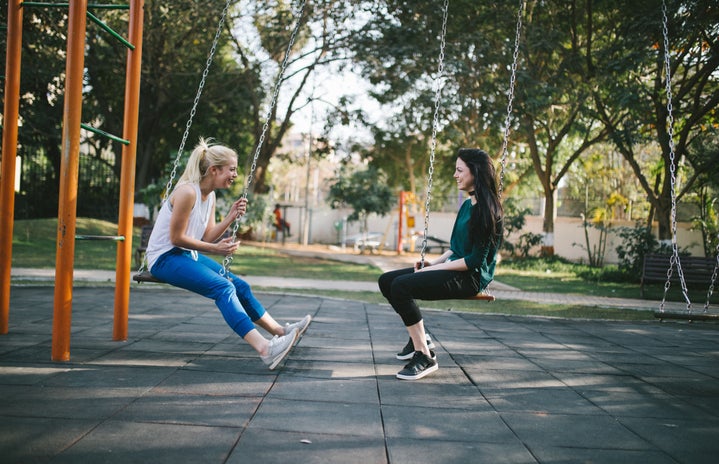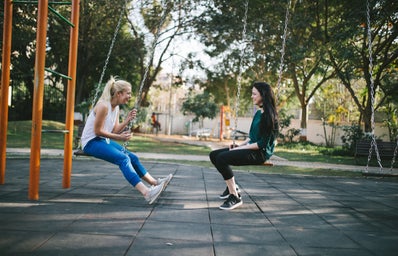Hopefully, by now, we’re all more or less on the same page about confirming consent before (and during!) sexual encounters. The truth is, there are some less obvious other areas of our life where we need to respect people’s autonomy and choices. It is easy to think, “I know better than they do,” or “This is my friend/partner, I know they won’t mind if I…” but we can just as easily fall into predatory thinking. By seeking consent for non-sexual activities, we can set the tone for our culture that does not highly value continual, enthusiastic consent. The best thing about this is, when many people don’t obtain consent, they are afraid of “killing the mood” (which has never once happened to me, personally — quite the opposite). But in these scenarios, there is no sexual mood to “kill,” and therefore, no excuse not to ask permission. Let’s get started, shall we?
- Little Kids and BAbies
-
This first one may be obvious or customary for some people, but we should ask permission before hugging, kissing, or picking up children. I know they are just the sweetest, cutest, most kissable little things, but it is never too soon to teach a child that their body is theirs and should be respected. A hurt child needs to be picked up and moved, and babies can’t understand these concepts. In these cases, it is still appropriate to narrate to the child what you are doing to them: “I’m going to change your diaper now, okay? I’m going to take off your diaper so we can get you nice and clean.”
See that? Easy. And while we’re at it, let’s not touch pregnant women’s bellies or take their babies without asking permission first, okay? Bare minimum, people.
- HAir
-
Say it with me: “Someone’s interesting hair is not an invitation for me to touch it.”
I used to have very long, curly, blonde hair. If I wore it down, people I didn’t even know (typically women, I’m sorry to say) would creep up behind me, stroke or grab my hair, and croon some compliment to me. Umm, hello?? That’s my hair, and I can’t stand to think some stranger is touching it!
I understand this problem is significantly worse for black women, especially those with locs or weaves. I’ve heard many say that random people would approach them, sometimes ask to touch it, but start feeling these women’s hair more often than not without permission.
With hair, we need to do better about asking consent and maybe rethink whether we need even to seek this sort of encounter with someone at all. Do you want a stranger touching you? I don’t, either. Don’t even ask. But certainly don’t touch me without asking. That is the exact behavior of “not respecting boundaries” that we are trying to eradicate from society.
- Personal Items
-
Someone being in a friendship or relationship with you does not give you free access to their journal, poetry, artwork, closet, phone, or (dare I say it?) refrigerator. Let’s practice seeking consent and permission for these things. And remember, just because someone was OK with you reading their journal yesterday does not mean they are OK with it today. We are adults; we can take no for an answer, but more importantly, we need to make our loved ones feel safe, and it is always better to err on the side of caution than regret.
It can be a simple, “Hey, mind if I eat this?” or “Could I look at that?” It doesn’t need to be ceremonial and can be as easy as changing “Give me your phone” to “Can I use your phone for a second?”
Of course, some people don’t care if you help yourself to their snacks or steal their hoodies, but everyone needs to check in with their loved ones occasionally to ask, “Is this still OK? I want to make sure.” It is important to hear it confirmed from their mouth (“Make yourself at home,” “Take anything from the fridge,” “Want to see this dragon I drew?”) before assuming you have a right to something that is not yours. Take what they freely give, and do not pressure your friends into sharing.
- Food / Alcohol
-
I keep a kosher diet and don’t like alcohol; my mother was vegan or vegetarian for over 14 years of her life and can’t have caffeine for medical reasons. I will not rag on wait staff here — we all know that they work their tails off and don’t make enough for it, and I’ve never blamed them. But I cannot tell you the number of times I’ve had people try to slip pork, shellfish, or alcohol to me. My mother had to deal with friends trying to “trick” her into eating meat or making light of her caffeine intolerance.
I’ve heard many people declare they don’t like a particular food, only for everyone around them to try to convince them otherwise suddenly. Sometimes these methods include sneaking bits of that food onto the person’s plate and gleefully shouting, “Aha, you ate it, you ate it!”
Here is a crucial way to see that we still don’t value consent enough. What if I was allergic or diabetic, and you could end my life by giving me peanut butter or full-sugar soda? What if, as in my case, I avoid certain foods for religious reasons? Or, horror of horrors, I don’t want to eat that food for no other reason?
We must be considerate of the choices people make for their food or drink. It doesn’t benefit us to try and convince them otherwise. Instead, it shows that we don’t care what they say, and our ego or love for that food is too great to ignore. It is terrifying to think of that same mindset present in a sexual setting.
Countless people lie about having severe allergies to avoid being tricked, harassed, coaxed, or mocked. Why should someone have to lie about this? Friends, family, coworkers, etc., should know better than to lie about something to trick a person into eating it. This trick isn’t just sneaking spinach into your kids’ brownies to get them some vitamins — this is an outright denial of preference and is coercion.
If we want to start seeing consent being regularly sought and expected before sexual experiences, we should also apply a consent mindset in other interpersonal areas. The heart of consent is respect for others and their choices without trying to convince them otherwise. That is what we should all give to, and expect from, our lovers and friends.


